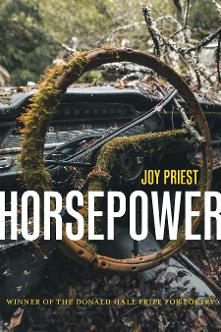Interview
Interview with Joy Priest
U.S. Poet Laureate Natasha Trethewey chose Joy Priest’s poetry manuscript, Horsepower, as the 2019 winner of the Donald Hall Prize for Poetry. Trethewey wrote that Horsepower is “a captivating display of might and elegance, a language of astonishing sinew through which the backdrop of place and a compelling life come into vivid focus. Undergirding these poems is a restless, resilient spirit: an urgent grappling with the desire to both remember and outrun the past, with history both personal and communal, and the complexities of American racism in its most intimate manifestation—familial love.”
Joy Priest, a native of Louisville, Kentucky, who grew up in the shadow of Churchill Downs, is the recipient of the 2020 Stanley Kunitz Prize. Her poems have appeared in the Academy of American Poets’ Poem-a-Day, The Atlantic, and Poetry Northwest, among others. Her essays have appeared inThe Bitter Southerner, Poets & Writers, ESPN, and The Undefeated. Priest has been a journalist, theater attendant, waitress, and fast-food worker in Kentucky, and has facilitated writing workshops and arbitration programs with adult and juvenile incarcerated women. She is currently a doctoral student in Literature & Creative Writing at the University of Houston.
We asked Joy to talk about her work as a poet and her work in Horsepower as well as the role of the artist in the midst of a global pandemic intensified by extreme racial and political division and unrest.
Still: Could you talk about your early life and what influences there brought you to writing poetry?
Still: Recently in a conversation with Bernardo Wade, you said, “The authority of black childhood is an epistemology.” Could you talk more about that idea?
Still: Have you found that any of your poems from this collection may take on new/different meanings when read in this current climate?
I had, foryears, been taught to live that way: Black, unassumingzipped up in history—a disease not even progress can cure.
Still: What is one poem from Horsepower that you particularly like? Tell us about that poem’s specific evolution, inspirations, achievements, or anything interesting that would help readers to know about that poem.
Still: What have you created during the pandemic? Are you working on anything now? Could you tell us briefly about it?
Still: Finally, we’d like to know what’s on your reading list. And what are you reading or what have you read recently that you’d recommend to others?
_____________________________________________
Home Archives Fiction Poetry Creative Nonfiction Interview Still Life
Featured Artist Reviews Multimedia Contest Masthead Submit Feedback
_____________________________________________

